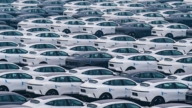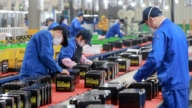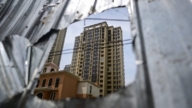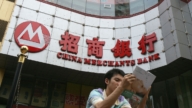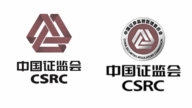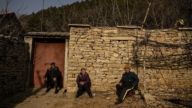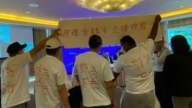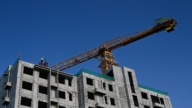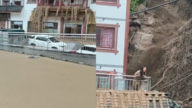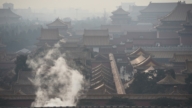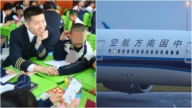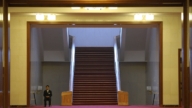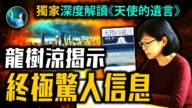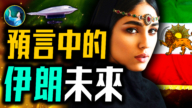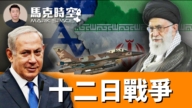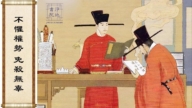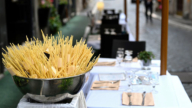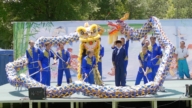【新唐人2014年01月17日讯】中共国务院新闻办公室日前发布2013年金融统计数据,外汇储备余额近4万亿美元。在经济学家眼中,外汇储备是把双刃剑,并非越多越好。下面让我们来听听专家的看法。
中共国务院新闻办公室,就2013年金融统计数据,15号举行发布会。
中国人民银行调查统计司司长盛松成:“年末,国家外汇储备余额3.82万亿美元,比上年末增加5097亿美元。”
中国的外汇储备主要由四个部分组成:一是巨额贸易顺差﹔二是外国直接投资净流入的大幅增加;三是外国贷款的持续增多;四是对人民币升值预期导致的“热钱”流入。
当外汇储备额达到3万7千亿美元时,中国国家外汇管理局局长易纲说,外汇储备超过一定量以后,边际成本已大于边际收益,等于你再增加就不合算了。
北京师范大学MBA导师、经济专栏作家段绍译:“这是一个非常愚蠢、错误的决定。因为国际贸易的优点,是每一个国家成为市场,发挥各自的优势,收支平衡。如果你这个钱不去买东西,等于是一包废纸,把这个财富白给人了。”
有较大的外汇储备规模,可以保证市场的安定。然而,过多的外汇储备也会加大人民币汇率升值的压力,如果为了减轻人民币升值压力,而增加货币供给或降低利率,本来就已经极为宽松的货币市场,将因此变得过度宽松,从而刺激国内资产市场泡沫膨胀。有很多负面影响。
北京大学教授、中国经济学家厉以宁也曾公开表示,外汇储备不是越多越好,主要是得用掉!
北京师范大学MBA导师,经济专栏作家段绍译介绍,目前中国的外汇储备,大多存在美国的银行里,买了美国的国债,而中国大量民营小企业却有无处贷款的问题。公开信息显示,中国所买的美国国债,到去年底已超过1万3千亿美元。
对比西方国家,中国外汇储备居高不下的原因是什么?北京《国情内参》期刊首席研究员巩胜利表示,西方的货币是由一个独立的货币管理委员会来管理。他说,像美国和欧盟,都没有政党控制货币的机制,因为他们没有权力控制货币资源。
北京《国情内参》期刊首席研究员巩胜利:“而中国不同,中国的人民币是1948年的10月1日开始运行的,到现在已经超过65年了,它一直是党控制的。中央银行也就是人民银行,其实它只是外面的一个幌子,只有策略的建议权,它没有决策权。”
北京当局多年来努力迫使西方国家承认中国是完全市场经济,但美国和欧洲都拒绝承认。巩胜利点出了操控中国外汇储备的关键人物。
巩胜利:“党的操纵,肯定对它有利他才放,不有利就收。党控制的这些人民银行报到政治局,政治局是7个委员,以前是9个委员。他来决定执行上或者下,执行或者不执行这么一个策略。”
15号,深圳大学教授、大陆经济学家国世平教授在微博上写道:“我国之所以出现这种情况,是因为制度性障碍,原来我国缺少外汇,企业出口创汇,都必须交给国家,企业拿人民币。我国目前外汇多了,应该改变这一状况了,让企业自己留用外汇,藏汇于民。”
对于解决巨额的外汇储备,国内外专家学者提出各种建议。段绍译认为,关键是当局不要干涉经济。
段绍译:“我们政府要重视这个问题,本来是政府不应该管经济。市场自己能解决的事情政府不应该管。我们这个政府它又不会管。没有哪一个国家的政府真正管企业,企业应该是由企业家来管。”
段绍译介绍,在西方国家,政府的作用是补充市场的缺陷。如:提供最低生活保障,推行义务教育,医疗保险等。民众评价,在中国,当局所做的正好相反。
采访编辑/唐音 后制/周天
CCP Sitting on Almost $4 Trillion USD in Foreign Reserves. Why?
The Chinese Communist Party (CCP) State Council
Information Office recently released the 2013 financial statistics.
China’s foreign exchange reserve is nearly $4 trillion USD.
Economists regard foreign exchange reserves as a
two-edged sword, more is not necessarily better.
CCP State Council Information Office held a press conference
on January 15, 2014 on the 2013 financial statistics.
People’s Bank Survey & Statistics Secretary Sheng Songcheng:
“At the end of December 2013, the country’s foreign exchange
balance was $3.82 trillion,
an increase of $509.7 billion over the previous year."
China’s foreign exchange reserve has four parts:
First, huge trade surplus,
Second, substantial increase of foreign direct investment,
Third, sustained increase of foreign loans,
Fourth, “hot money" led by expected RMB appreciation.
When foreign exchange reserves reached $3.7 trillion
China’s State Administration of Foreign Currency
Secretary Yi Gang said:
when foreign exchange reserve exceeds a certain amount,
the marginal cost is greater than marginal revenue.
Then,further increase is uneconomical.
Beijing Normal University MBA instructor, economic columnist
Duan Shaoyi:
“This is a stupid and wrong decision.
The advantage of international trade is to have each country
as the market, play everyone’s strengths and break even.
If you do not buy with your money,
then money becomes a pile of paper.
And you give the wealth to others."
A large foreign exchange reserve can ensure market stability.
But too much reserve increases the pressure of RMB appreciation.
Alleviate the pressure of RMB appreciation by increasing
the money supply or lowering interest rates.
The already extremely loose monetary market will become
too loose, and will stimulate the domestic asset market bubble.
There are many negative effects.
Peiking University Professor and China’s Economist Li Yining
also publicly stated that foreign exchange reserve is not the more
the better. The key is to use it!
Duan Shaoyi said China’s foreign exchange reserve now
is mostly in U.S. banks and is used to buy U.S. Treasury bonds,
China has a large number of private small business
that cannot get loans at this time.
Public records indicates that U.S. Treasury bonds
bought by China surpassed $1.3 trillion.
Beijing’s Internal reference Chief Researcher Gong Shengli said
Western currency is managed by an independent committee.
He said that the U.S. and the European Union do not have
a monetary mechanism controlled by a political party.
They do not have the right to control monetary resources.
Gong Shengli: “In China it is different.
Chinese RMB started on October 1, 1948
and has been circulating for 65 years.
It has always been controlled by the Party.
China’s Central Bank is the People’s Bank.
But it’s only a show.
It only provides the authorities with suggestions.
It has no authority to make decisions.”
The Beijing authorities for years were trying to force
Western countries to admit China is a market economy,
but the U.S. and Europe refused to admit it.
Gong Shengli pointed out the key people
who manipulate China’s Foreign exchange reserve.
Gong Shengli: “CCP’s manipulation is based on
whether it is good for the CCP or not.
Banks report to the CPP Political Bureau of seven members.
In the past there were nine members.
They decide either to go up or down, etc.”
On January 15, Shenzhen University professor and economist
Guo Shiping wrote on his microblog:
The cause of this situation are the restrictions caused by the system.
In the past, we did not have enough foreign exchange.
Money came from enterprises. Export revenues were handed to
the State.Companies took Chinese RMB.
China’s current foreign exchange reserve is high.
We should change this policy,
allow enterprises to retain foreign exchange and
give foreign exchange to the people.
To resolve the issue of huge foreign exchange reserves,
China and foreign experts put forward various proposals.
Duan Shaoyi believes that the key is for
the authorities not to interfere with economy.
Duan Shaoyi: “Our Government should pay attention to this.
Government should not manage the market economy.
They should not be involved in the areas
that can be adjusted by the market.
Our Government also does not know how to manage the
economy. No other country’s government manages enterprises.
Enterprises should be managed by entrepreneurs. “
Duan Shaoyi stated that in Western countries,
the role of Government is to supplement market deficiencies
such as:
providing minimum living standards,
promoting compulsory education and medical insurance, etc.
In China the authorities have done just the opposite.
Interview & Edit/Tang Yin Post-Production/Zhou tan


